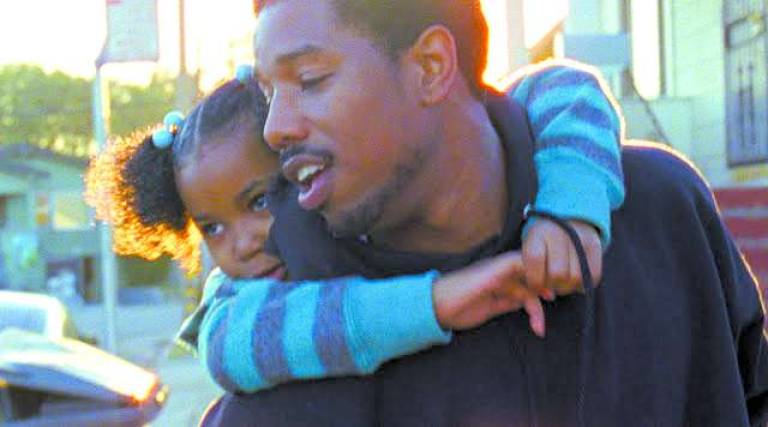Diary of a Statistic

A star turn becomes social protest in Fruitvale Station
Young Black males rarely get such a smoothly beautiful portrait as in Fruitvale Station. Actor Michael B. Jordan (who was the Obama-like candidate for Student Council President in last year's Chronicle) gives this year's most powerfully affecting performance in Fruitvale Station. From making love to his girl Sophina (Melonie Diaz), beaming at his toddler daughter Tatiana (Ariana Neal) to respectfully addressing his mother Wanda (Octavia Spencer), Oscar is first seen as tender and naturally charismatic, an irresistible character study--and a star turn--until he gets "normalized" into a mysterious, disturbing memorial to a real-life tragedy.
The little goatee growing on Jordan's baby-fat chin marks him at an indeterminate stage of manhood when responsibility and social pressure descend upon him. At 22-years-old, Oscar is an awkward age for social-protest cinema that customarily prefers statistical victim protagonists (as in the adolescent dramas Boyz N the Hood, Fresh, Beasts of the Southern Wild, Precious, Menace II Society, et al). Oscar already has a jail record but suppresses his worldliness and is ready to give up selling pot; yet his temper attests his intellectual as well as physical reflex to deal with harsh experience. Jordan conveys multiple feelings in Oscar's eyes and voice: his feral and jovial moods, his hair-trigger anger and ardent affection.
At this level, Fruitvale Station represents the triumph of a young actor's handsome vibrancy representing those young men who remain enigmas on 24-hour-news-networks. But you cannot write a character like this--as director-writer Ryan Coogler's superficial screenplay unwittingly demonstrates. Coogler was fortunate to find Jordan who makes better sense of Oscar's imperfect character than can the sociological sentimentality of this victim story.
Fruitvale Station is named for the subway stop of the Bay Area Rapid Transit where Oscar Grant was killed during a stop-and-frisk police procedure in 2008. Set in Oakland, Calif. (memorably the setting of Mario and Melvin Van Peebles' extraordinary Panther, a dramatic history of the Black Panthers), it doesn't recreate the tragedy with political consciousness like the Van Peebles; Coogler's softer approach settles on sorrow, the stuff of folk legend.
Coogler makes Oscar an existential casualty (as suggested in the overly symbolic scene where he helps a stray dog after a hit-and-run accident) which might be even worse than analyzing another infuriating municipal accident. Jordan's marvelous characterization is betrayed by this concept. In the end, Oscar's recognizable urban personality and frustrated ambitions are all angled to fit a sociological profile. The subway sequence where Oscar and Sophina celebrate with New Year's Eve passengers seems specifically West Coast geniality. But this surprising bonhomie is conveyed with a suspicious fake-documentary distance. At times Coogler steps back from his tale as if creating Bressonian distance through mismatched cuts, empty station shots and rough cell-phone imagery. These dubious esthetics smack of Sundance patronization (where Fruitvale Station took the Grand Prize). It misses the reality of Black urban consciousness--such as "The Black Book of Survival" that community activists used to hand out around Brooklyn's Borough Hall warning young men: "When the police approach you CALM DOWN. They want to kill you."
Condescending to young men like Oscar may let Sundance swag-baggers feel better about themselves but reducing Oscar to a social statistic ruins the crucial moments when his behavior and fate need to be seen as clearly, unhurriedly and precisely as possible. It would imprint the life force that Jordan makes so attractive.
Follow Armond White on Twitter at 3xchair